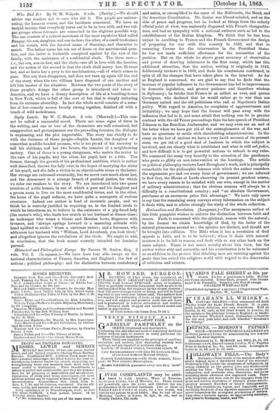Historical and Philosophical Essays. By Nassau. W. Senior, Esq. 2
vols. Vol. L (Lingman.)—We have here four able essays on the national characteristics of France, America, and England ; the law of nations ; political philosophy ; and the distinction between confederacy Ito Did It? By W. W. Walpole. 3 vols. (Newby.)—We should I and union, as exemplified in the eases of the Zollverein, the Band, and the American Constitution. Mr. Senior was liberal-minded, and en the side of peace and progress, but he looked at things from the orderly official point of view, was eminently disgusted with French changeable- ness, and had no sympathy with a national outburst such as led to the establishment of the Italian kingdom. We think that he has been unjust in ascribing to France and the French Government the design of preparing for war with this country in 1862, and that in censuring Cavonr for the intervention in the Pontifical States he has not made sufficient allowance for the necessities of the position. But on the whole he shows great accuracy of observation and power of drawing inferences in the first essay, which has this additional attraction, that the author, writing it originally in 1842, deliberately reviews it in 1862, and finds his conclusions confirmed, in spite of all the changes that have taken place in the interval. As far as England is concerned, we are glad to say that he finds that the increase of popular influence in the Government has led to improvement in domestic legislation, and greater patience and therefore wisdom in diplomacy ; he thinks that France is as selfish as ever, and quotes Cavaignac, who declared that he would rather go to war than see Germany united, and the old politicians who rail at Napoleon's Italian policy. With regard to America, he complains of aggressiveness and irritability ; we may hope that the former will pass away with the influence that led to it, and must admit that nothing can be in greater contrast with the old Texan proceedings than the late speech of President Johnson to the Brazilian Ambassador, and we may even see an end of the latter when we have got rid of the entanglements of the war, and have no questions to settle with slaveholding administrations. In the essay on the law of nations we have a very lucid account of its present state, we get rid of a good deal of haziness in which the subject is involved, and see clearly what is established and what is still sub judirr; and how difficult it is to get powerful nations to submit to any rules. We commend the essay very heartily to the attention of the gentlemen who prate so glibly on non-intervention at the hustings. The article on political philosophy reviews Lord Brougham's work, and is principally remarkable for the philosophic fairness with which the author considers the arguments pro and con every form of government ; we are relieved to find that, the House of Lords observing its present prudent course, we have every reason to be satisfied with our own, except in the matter of military administration ; that for obvious reasons will always be a difficulty in a constitutional country ; and "an absolute Government, purchases at an enormous price this advantage." We have only space to say that the remaining essay conveys every information on the subject it deals with, and to advise strongly the study of the whole collection.






























 Previous page
Previous page